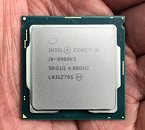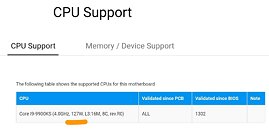Friday, September 27th 2019

Intel Core i9-9900KS to Cost around $600
Australian e-tailer MWave has put up their product page for the Intel Core i9-9900KS processor that Intel announced earlier this year, but with no actual product in sight. The merchant's listing is showing an AUD 899 price for SKU BX80684I99900KS, which converts to USD 605. The new Intel processor, is basically a binned eight-core Coffee Lake Core i9-9900K, which runs at 4.0 GHz base clock (up by 400 MHz) and 5.0 GHz all-core Turbo (300 MHz increase). Single-core maximum Turbo remains at 5.0 GHz (just like on the Core i9-9900K).
Just earlier this week, ASUS posted a BIOS update note, mentioning in it that the Core i9-9900KS will have a 127 W TDP. It looks like Intel can definitely defend the gaming performance crown with the Core i9-9900KS, mostly thanks to its high clock speeds. However, since most of the improvements are in multi-core workload boost clocks, and single-threaded clocks are identical to 9900K, I'm having some doubts whether the processor can really make any substantial difference — it's definitely not going to beat the $100 cheaper Ryzen 9 3900X in Cinebench, and the 127 W TDP limit might mean that the 5.0 GHz all-core Boost will end up being active only for a short amount of time.
Just earlier this week, ASUS posted a BIOS update note, mentioning in it that the Core i9-9900KS will have a 127 W TDP. It looks like Intel can definitely defend the gaming performance crown with the Core i9-9900KS, mostly thanks to its high clock speeds. However, since most of the improvements are in multi-core workload boost clocks, and single-threaded clocks are identical to 9900K, I'm having some doubts whether the processor can really make any substantial difference — it's definitely not going to beat the $100 cheaper Ryzen 9 3900X in Cinebench, and the 127 W TDP limit might mean that the 5.0 GHz all-core Boost will end up being active only for a short amount of time.


73 Comments on Intel Core i9-9900KS to Cost around $600
Thanks but no thanks.
siliconlottery.com/collections/all/products/9900k50g
At Silicon Lottery you'll have to pay $580 for a 9900K that overclocks to 5.0GHz.
Intel asks $25-ish more, but for that we get (compared to SL):
- global availability,
- Intel warranty compliant with local law,
- a decent chance that the CPU will OC even higher.
When you buy a 5GHz 9900K from SL, that's very likely all that it can give. They sell 5.1GHz models for a lot more.
Moreover, how exactly is that different from what AMD has been doing?
3800X is basically a "binned factory overclocked" 3700X.
+300MHz base, +100MHz boost. AMD asks $70 for that.
That's a bit too much for the 2 minutes "Go in to the BIOS -> put MCE on" operation.
- Recycled technology
- Still 8 core
- High price compared to competition
- Still has security issues that haven't been fixed
- other things that at the moment doesn't come to mind.
These are from the top of my head I could think of as of now. I'm sure there is more.
There is also a significant lower chance in the future for an ordinary customer to get lucky and get an 9900K 5GHz+ unless he pays +$100 for the 9900KS.
Intel has not only done this to compete with AMD, they also wanted to prevent Silicon Lottery and ordinary buyers of 9900K to get more value than that they paid for.
- Recycled technology: How? It's just a new addition to the current lineup
- Still 8 core: It's more than enough for gaming
- High price compared to competition: What competition? The 9900K? Amd can't compete with either in gaming
- Still has security issues that haven't been fixed: Yep, Just like all other Intel CPUs
- other things that at the moment doesn't come to mind.: There are MANY but NONE related to this part's intended market. Gaming...
trog
In a blind test, I'll assure that you and many other won't be able to distinguish 9900k from 3900x while playing games.
Besides you are looking at this the wrong way. If Intel didn't feel threatened by AMD, Intel wouldn't release KS version of 9900K. Gamin is a marketing scheme to attract customers since this is the only area where Intel is better than AMD. Although by a tiny bit. What Intel can do now is to exploit this advantage, even though small, is the only thing Intel can do at the moment and Intel does it. What else is there aside that marginal gaming advantage?